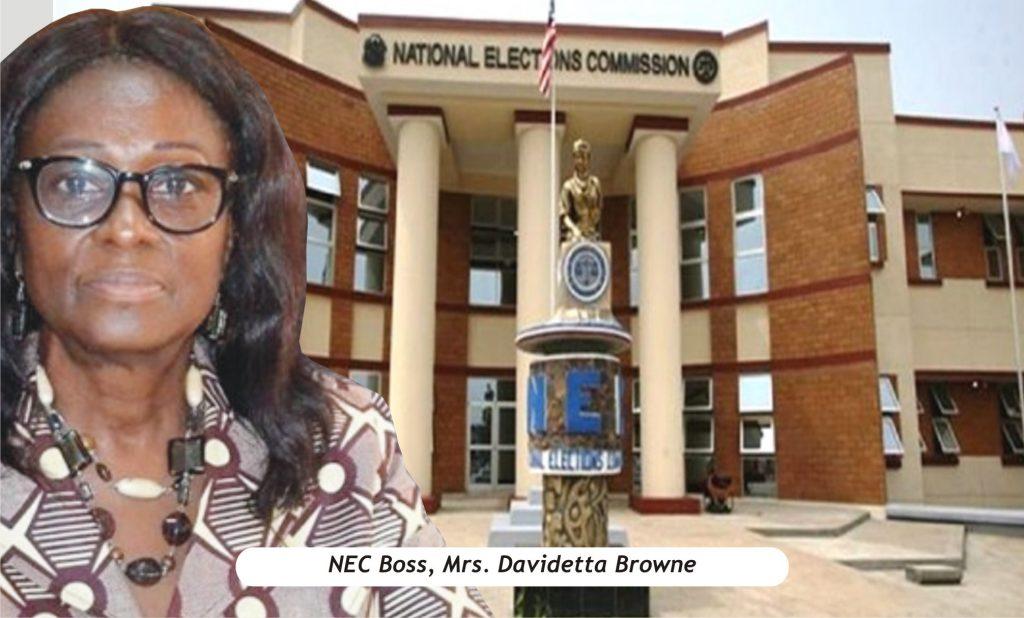Africa-Press – Liberia. Criminal Court ‘C’ Judge T. Ciapha Carey reserves ruling in defense lawyers’ motion to dismiss the trial of the Chairperson of the National Elections Commission (NEC) Davidetta Browne-Lansanah, following heated argument between defense and prosecution lawyers
State prosecutors recently filed a counter-motion, requesting Judge Carey to dismiss a motion by lawyers representing the NEC Chair Davidetta Browne Lansanah, which seeks dismissal of the trial.
The NEC had earlier filed a motion seeking a complete dismissal of the entire case on grounds that the Liberia Anti-Corruption Commission (LACC) lacks the legal reliance to prosecute the crime – insider trading on the basis that the law has not been enacted and that the court itself lacks jurisdiction over the matter.
On March 8, lawyers representing Mrs. Browne-Lansanah filed a motion, asking Judge Carey to dismiss the case saying, the alleged crime of insider trading upon which the LACC is prosecuting their client has not been enacted.
The LACC thru its Executive Chairperson Cllr. Edwin Kla Martin on Wednesday, December 15, 2021, indicted Madam Browne Lansanah for alleged conflict of interest and corruption.
It had been reported in November 2021 that the NEC, under the supervision of Chairperson Davidetta Browne Lansanah during the November 16, 2021 by-elections in four counties, rented thermometers from a company called Tuma Enterprises Inc., allegedly owned by her brothers for over US$180,000 outside of government procurement regulations.
She was charged and indicted for the alleged crime of insider trading in violation of Part II, Section 2.2 of the 2008 Corruption Acts establishing the LACC.
Making their argument Wednesday, March 16, 2022, the defense lawyers argued that the alleged crime of insider trading has not been enacted into law and has not been penalized under Liberian statutory laws therefore, their client cannot and should not plead to the alleged crime of insider trading.
The lawyers also argued that the court does not have any jurisdiction over their client as it relates to the violation of the Code of Conduct for public officials because that instrument provides its own disciplinary processes in the event where there is an infringement/breach of the Code in Part XIV Section 14.1.
“Listen to me, you cannot use a legal means to solve illegal problem. Violation for the Code of Conduct is legal therefore, it cannot be solved by illegal means. Every act that is consider as criminal is legislated in our penal code but nothing is done in this case so we cannot use unlawful means to legal means. Let them quote the section in the law that provides that insider-trading is a crime’’, defense lawyers argued.
They defended their argument by propounding that Part XII of the very Code of Conduct provides for the creation of the office of an Ombudsman: section 12.1 of the Code of Conduct states: “The office of an Ombudsman is hereby established as an independent autonomous body which shall be responsible for the enforcement, oversight, monitoring and evaluation of the adherence to the Code of Conduct”
However, state prosecutors in their motion countered that the LACC acted properly in the absence and creation of the office of the Ombudsman, maintaining that antigraft institution acted in its stead.
But the NEC’s arguments are: (1) that “insider trading” is not a cognizable crime under Liberian law; and (2) that under the national code of conduct, the ombudsman has the sole authority to receive and investigate complaints of alleged violations and impose sanction, noting that, while “insider trading” is mentioned in the LACC act and the anti-money laundering act, that mention is conditional, first because those acts do not define what constitutes insider trading, neither do they say what the penalty is. Next, they say the money laundering act in section 15 lists several predicate offenses and says as may be provided in the penal code or other Liberian laws.
They continue that being aware that the Liberian law doesn’t provide any definition and penalty of what insider trading is, the LACC (in the indictment) cited the definition of insider trading from Black’s law dictionary, this, the defense insists is unacceptable, especially in matters of criminal allegations.
However, the problem with this argument, legal experts explained is that in matters of public laws, a party/commission can’t assume authority unto itself, and that authority must be stated in the law, in this case, the Code.
According to them, assuming but without agreeing the LACC could act in the absence of the ombudsman, does the Code give criminal court “C” jurisdiction to impose the Code’s administrative sanctions on a person? There’s absolutely no provision in the Code for the criminal court to impose and/or judicially review the imposition of the Code’s administrative sanctions.
In response to defense lawyers’ argument, the LACC legal team says the case as it relates to insider trading and market manipulation is in violation of the Code of Conduct, consistent with Part XVII: Criminal Offence, therefore it is acting properly.
The prosecutors also insist that the court has jurisdiction over the case because the statute that creates the Criminal Court “C” confers such jurisdiction.
Making his determination after listening to both sides, Judge Carey announced Wednesday, March 16, 2022, that ruling in the matter is suspended, pending notice of assignment.
For More News And Analysis About Liberia Follow Africa-Press






